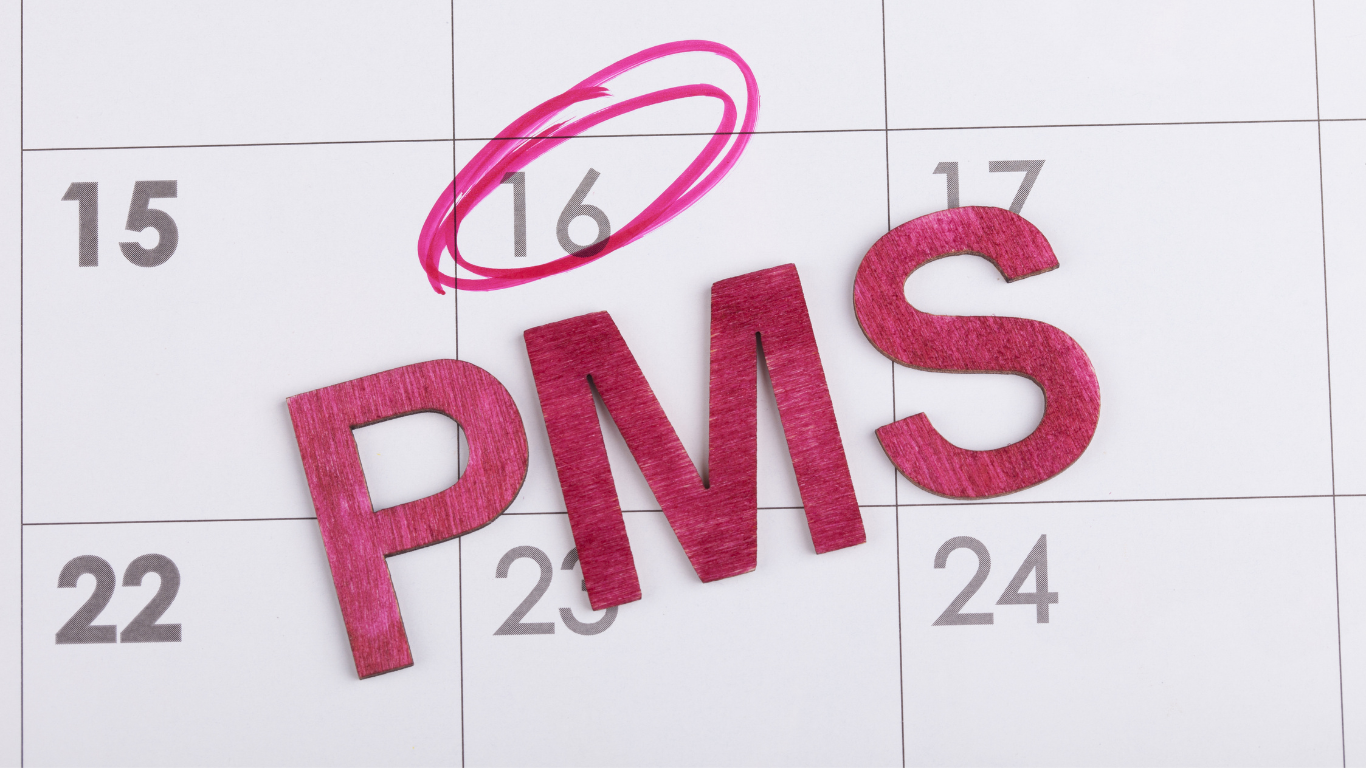
What is PMS?
Premenstrual syndrome (PMS), refers to the symptoms experienced in the luteal phase before menstruation. If you’re looking for natural remedies for PMS, understanding the causes and symptoms is the first step.
PMS affects most women of reproductive age , with up to 80% reporting one or more symptoms and 20-32% experiencing mild to moderate symptoms. Some women may experience PMS more severe symptoms known as Premenstrual Dysphoric Disorder (PMDD), which can cause significant emotional and behavioural changes. See our PMDD blog post for more.
Common PMS Symptoms
Often these are emotional and behavioural symptoms but may also include physical symptoms too:
Emotional and Behavioural Symptoms
- Mood swings and irritability
- Feeling depressed/ low mood
- Feeling upset, anxious or emotional
- Trouble sleeping
- Low libido
Physical Symptoms
- Bloating
- Cramping
- Breast tenderness
- Headaches
- Acne
- Change in appetite
What Causes PMS?
The exact causes of PMS are unknown, but it is thought that PMS is caused because of changes in hormones related to the menstrual cycle.
There are a few key drivers to contribute to PMS symptoms:
Hormonal Fluctuations
One theory suggests that PMS symptoms may not be due to abnormal hormone levels, but rather an abnormal response to hormonal fluctuations in estrogen and progesterone during the luteal phase of the cycle.
Neuroactive Steroid changes
Progesterone is converted into a neurosteroid called allopregnanolone, which acts on GABA-A receptors in the brain to promote a calming effect. During PMS, GABA-A receptors may become less responsive, reducing this calming effect and potentially heightening anxiety, irritability, and mood swings.
It is also thought that the continuous rise of the allopregnanolone may change the GABA-A receptors in the brain and potentially cause it to adapt and become less responsive, and contribute to symptoms of emotional dysregulation.
Inflammation
Emerging evidence suggests that women with PMS may have higher levels of inflammation and lower levels of antioxidants. However, more robust research is needed before making definitive conclusions.
Diagnosing PMS
There are no physical tests to diagnose PMS, but your GP may ask you to record psychological, physical, or behavioural symptoms. Tracking symptoms in relation to your menstrual cycle in a diary or calendar, along with severity, can help with diagnosis.
Tracking helps identify patterns and informs personalised management options, including natural remedies for PMS.
Natural Remedies for PMS
If you’re looking for natural remedies for PMS, several non-pharmacological strategies could help with symptoms like bloating, fatigue, and anger.
These approaches are often safe, holistic, and supported by growing evidence.
Cognitive Behavioural Therapy (CBT) as a Natural Remedy for PMS
CBT helps manage problems by focusing on how your thoughts, beliefs and attitudes affect your feelings and actions. a study found that those who used a web-based lifestyle education website had better emotional, behavioural and physical PMS symptoms along with significantly improved health nutrition, exercise and general health.
CBT could reduce physical and behavioural symptoms of PMS. A systematic review also concluded that cognitive psychology-based interventions, such as relaxation, are viable non-pharmacological treatment options for PMS.
Exercise as a Natural Remedy for PMS
Exercise offers a wide range of health benefits. It releases endorphins, which boost mood and support overall wellbeing. Evidence has shown exercise in the days leading up to, and during the period, can help with an array of pms symptoms.
Exercise is a natural remedy for PMS anger and fatigue – in particular, 30 minutes of regular aerobic exercise can significantly reduce PMS symptoms.
Effective types of exercise include:
- Walking
- Yoga and Pilates
- Swimming
- High-Intensity Interval Training (HIIT)
Herbal and Plant-Based Natural Remedies for PMS
Chasteberry
Chasteberry, also known as Vitex Agnus Castus, has been used as a natural remedy for PMS, particularly to ease breast pain and tenderness. Clinical trials suggest that Chasteberry is well tolerated and a potential effective PMS supplement that can reduce PMS symptoms, but more research is needed to confirm its effectiveness.
Evening Primrose Oil
Researchers have carried out a few studies on the effects of evening primrose oil on PMS. They need to run more robust clinical trials before they can recommend it as a natural remedy for PMS.
St. John’s Wort
Many people use St John’s Wort, also known as Hypericum Perforatum, as a natural remedy for PMS. However, research offers only limited evidence that St John’s Wort effectively treats PMS.
One study suggested that St John’s Wort may help to improve common physical and behavioural symptoms of PMS but did not impact symptoms related to mood or pain, whilst another study concluded that St John’s Wort may affect emotional reactivity, hostility, anger and impulsivity related to PMS.
A further study found that St John’s wort was superior to placebo, however the results were not statistically significant.
There needs to be larger, more robust studies on the effects of St John’s Wort before drawing definitive conclusions on its role on PMS symptoms.
If you’re looking to make your period care more sustainable and supportive of hormone health, Saalt offers reusable, EDC-free period care options – made without endocrine-disrupting chemicals and you can get 15% off through the link above.
When to Seek Help for PMS
If your PMS symptoms are severe and impact your quality of life, you may be experiencing PMDD. Speak to your GP or consider booking a consultation with a Registered Dietitian for personalised support.
Conclusion
There are a range of natural remedies for PMS that may help alleviate both physical and emotional symptoms, including CBT, exercise, lifestyle changes and herbal remedies. For personalised guidance book an appointment with ourregistered dietitian. Or, to explore how nutrition and supplements can support your cycle, read our companion blog, PMS supplements, diet and fertility. If you’re also trying to conceive, ensure you’re taking appropriate fertility supplements (like a prenatal vitamin) to cover any nutritional gaps while managing PMS symptoms.
We would like to thank Georgina Taylor ANutr for her contributions to this article


